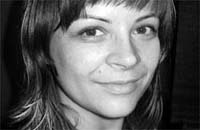Magda Wojtyra was born in Kalisz, Poland. Her family moved to Toronto in 1982 when she was nine. She studied architecture at the University of Waterloo, always opting for fledgling computer based design courses. Just after graduating in 1999 she started RNA Connective. Affiliated with the McLuhan Centre at the University of Toronto, the mixed group of artists, architects, engineers and scientists discussed issues of the early digital age. The projects ranged from editorial articles for Italian Domus Magazine to group participation in international conferences.
From this evolved RNA Studio, Magda’s own company with art and design projects that include websites, exhibitions, identity design, photography and fine art commissions for clients ranging from science research labs and educational foundations, to a dance studio and integrative health institute. In 2004 she gave a talk at the Royal Ontario Museum about the definition of digital art. Her large digital prints have been shown at the BCE Place Galleria in Toronto, and her images have been published in Shift magazine, Digital Journal, and the blog of National Geographic Traveler magazine. Photographs or scans of real objects such as plants or food are often the basis of Magda’s art, even when the end product is tangible, such as the hand beaded, silk quilt that was designed in PhotoShop based on a photo of a flower. A kind of reversal of the act of recognition, her work is very colourful, often dreamlike and strongly evocative of the quality of ideas on the edge of sleep or reason.
Also on the edge of reason, in 2005 Magda gave up her Toronto apartment, sold or gave away most of her stuff, and embraced a techno nomad life. With her boyfriend Marc Ngui, also an artist, and laptops, a camera and rolling duffel-bags full of art supplies, she has wandered parts of Canada, Central America and Southeast Asia. It became obvious, after working for a month on two Canadian websites and an Italian show of photography from Koh Mak, a tiny Thai island paradise, that the success of a mobile lifestyle is only limited by one’s proximity to an internet connection and a tolerance to physical uprootedness.
In January 2008 Magda is moving to France for a year to live rent-free in a renovated train station in the countryside of the Poitou-Charante region. She found this housesit opportunity online in one of the many specialized online communities. The state of access to the Internet in France is reputedly one of the highest in the world. Promising, as Magda will be launching several Internet based projects in the next year, including an Etsy store. Flying around the world, tethered to a server.

